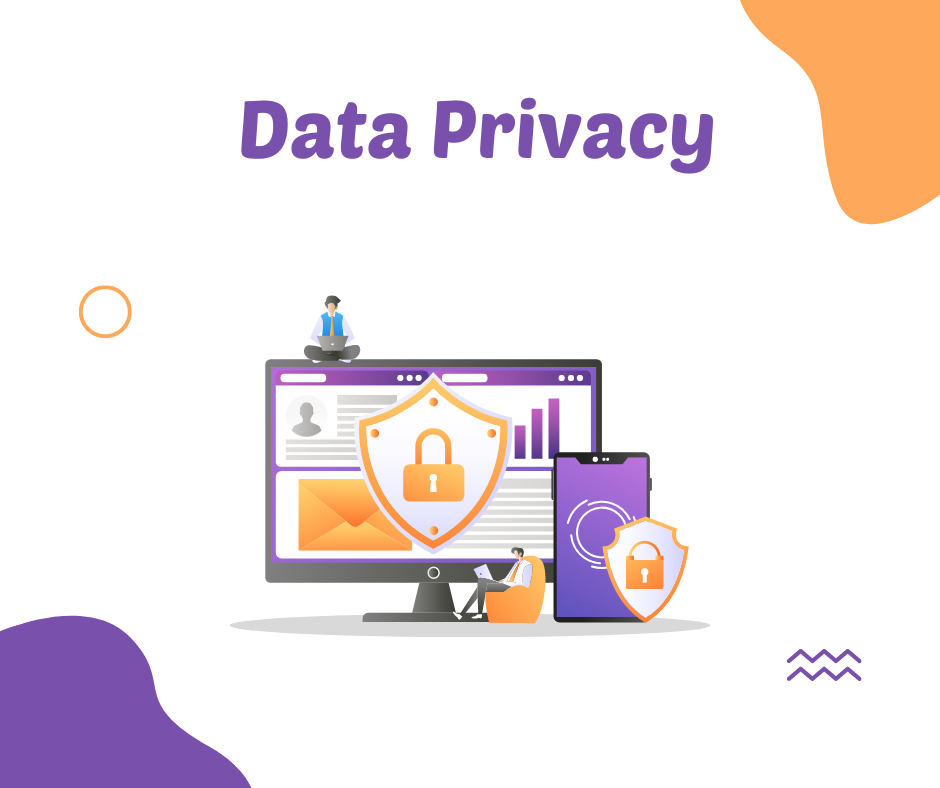Data Privacy or Information Privacy
Is a branch of data security concern with the proper handling of data. Specifically, data privacy concern often revolves around: Whether or how data is shared with third party, How data is legally collected or stored, and Regulatory restriction. Privacy of Information is extremely important in this digital age where everything is interconnection and can be access and use easily. The possibilities of our private information being extremely vulnerable are very real, which is why we required data privacy.
Data Privacy is the necessity:
To preserve and protect any personal information collected by any organization from being access by a third party. It is a part of a Information Technology that helps the individual or an organization to determine what data can be shared and which should be restricted. Data privacy is the right of individual no to have private information about itself disclosed and to live freely from surveillance and intrusion.
*Personal Information is any information which can be linked to your identity.
Why is it important?
There are two drivers for why data privacy is one of the most significant issues in industry.
- Data is one of the most important assets a company has with a rise of a data economy. Company finds a normal value in collecting, sharing, and using data. Company such as Google, Facebook and Amazon have all built empires attack the data economy transparency in how business request consent and manage the data collected vital to building trust and accountability with customer and partners who expect privacy.
- Privacy is the right of an individual to be free from surveillance. To simply exist in one place and freely express one’s opinion behind closed doors is critically to living in the democratic society.
Organizations commonly believe that keeping sensitive data secure from hackers means they’re automatically compliant with data privacy regulations, but this is not a case.
Data Security and Data Privacy
Data Security and Data Privacy are often use interchangeably but there are distinct differences:
- Data Security – protects data from compromise by external attackers and malicious insiders.
- Data Privacy – governs how data is collected, shared, and used.
Consider a scenario where you’ve gone to great lengths to secure Personally Identifiable Information. The data is encrypted, access is restricted, and multiple overlapping monitoring system are in place. How ever if that Personal Identifiable Information was collected without proper consent, you could be violating a data privacy regulation even though the data is secure.
Types of Data
Any Personal Data that could be sensitive or can be used maliciously by someone is included when considering data privacy these data types included the following.
Online Privacy – This include personal data that is given out during online interactions. Most sites have a privacy policy regarding the use of the data shared by users or collected from users.
Financial Privacy – Any financial information shared online or offline is sensitive as it can be utilized to commit fraud.
Medical Privacy – Any details of medical treatment and history is privileged information and cannot be disclosed to a third party there are very stringent laws regarding sharing of medical records.
Residential and Geographic records – Sharing of address online can be a potential risk and needs protection from unauthorized access.
Political Privacy – This has become a growing concern that political preferences should be privileged information.
Data Privacy Act of 2012 (RA No. 10173)
In 2012 the Philippines passed republic act number 10173 or the Data Privacy Act of 2012. It was passed in accordance with the Philippines agreements under Asean Vision 2020 and at the urging of the growing business process outsourcing industry. It is the policy of the state to protect the fundamental human right of privacy of communication while ensuring free flow of information to promote innovation and growth.
National Privacy Commission
Are the country's privacy watchdog an independent body mandated to administer and implement the Data Privacy Act of 2021 and to monitor and ensure compliance of the country with the internal standards set for data protection.
Vision
Its vision is to be a world-class regulatory and enforcement agency upholding the right to privacy and data protection while ensuring the free flow of information. Committed to excellence driven by a workforce that is highly competent, future oriented, and ethical towards a competitive knowledge-based and innovation nation.
Mission
- It shall continuously deliver services to be the authority on data privacy and protection. Providing knowledge know-how and relevant technology.
- To establish a regulatory environment that ensures accountability in the processing of personal data and promotes global standards for data privacy and protection.
- To build a culture of privacy through people empowerment that enables and upholds the right to privacy and supports free flow of information.
NPC Major Functions
The major function of the national privacy commission is as follows.
- Rule Making
- Advisory - The NPC is the advisory body on mothers related to personal data protection.
- Public Education – The NPC shall launch initiatives to educate the public about data privacy, data protection and fair information rights, and responsibilities.
- Compliance and Monitoring - The body has compliance and monitoring functions to ensure personal information controllers comply with the law. It is also tasked to manage the registration of personal data process system. Personal information controller is an individual or institution or any other body who controls the processing of personal data on its behalf.
- Complaints an Investigation and Enforcement
Protect yourself when you’re online!
Here are some online security tips that may help you to protect your data online.
- Create strong passwords. – Use passwords that are hard to guess and keep track of it using a password manager.
- Be careful of what you download. – Don’t download content from sites that are not trustworthy. These may contain malware.
- Turn on privacy settings. – Take control of how companies use your data by enabling privacy features.
- Think before you post. – Avoid posting sensitive personal information online. Don’t share too much information either.
- Consider Additional Protection. – Install anti-virus software, anti-spyware software, and a firewall. So, it can detect potential threats in your system.



-1748399375.png)

-1742456856.png)

 (19)-1723771883.png)
 (17)-1721953744.png)